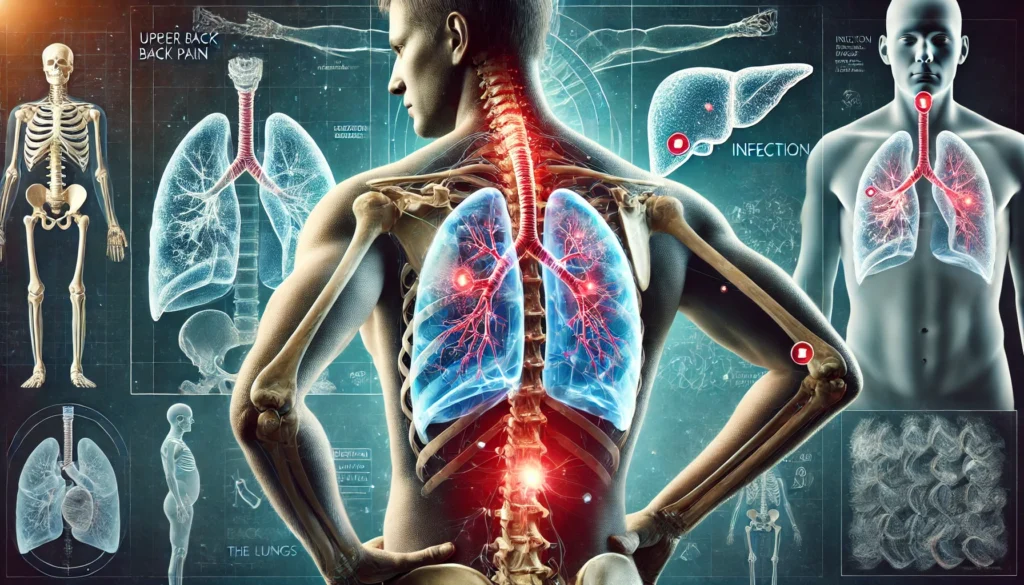Pneumonia is a serious respiratory infection that can affect people of all ages. While many associate pneumonia with symptoms like cough, fever, and chest pain, it’s important to note that upper back pain can also be a significant, though less recognized, symptom. In this article, we’ll explore the connection between upper back pain and pneumonia, its causes, related symptoms, and effective treatments.
What is Pneumonia?
Pneumonia is an infection of the lungs that causes inflammation in the air sacs. It can be caused by bacteria, viruses, fungi, or other microorganisms. When the lungs become inflamed, they may fill with fluid or pus, making it harder for oxygen to reach the bloodstream. This can result in difficulty breathing and a range of symptoms such as cough, fever, chills, and chest pain.
Why Does Pneumonia Cause Upper Back Pain?
Upper back pain is not the most common symptom of pneumonia, but it can occur for several reasons. Here are the main factors that contribute to upper back pain in pneumonia:
Coughing Strain:
Persistent coughing, which is a hallmark of pneumonia, can strain the muscles in your upper back. Repeated coughing puts a lot of pressure on the back muscles, causing them to tighten and become sore.
Inflammation of the Lungs:
Pneumonia causes inflammation in the lungs, and the inflammation can extend to nearby structures, including the diaphragm and muscles of the upper back. This can lead to pain radiating to the upper back region.
Pleural Inflammation:
The pleura is a membrane that covers the lungs and lines the chest cavity. When pneumonia affects the pleura (pleuritis), it can lead to sharp, stabbing pain that may radiate to the back, especially in the upper back area.
Postural Changes:
People with pneumonia often adopt abnormal postures to make breathing easier or reduce discomfort. These postural changes can place added pressure on the upper back muscles, leading to pain.
Referred Pain:
Sometimes, pain from the lungs or chest can be “referred” to the back. The nerves in the chest and back are interconnected, which means that pain in the chest or lungs can manifest as discomfort in the upper back.
Symptoms of Pneumonia That May Accompany Upper Back Pain

When upper back pain occurs in pneumonia, it is typically accompanied by other symptoms that indicate the presence of the infection. Common symptoms of pneumonia include:
- Fever and chills
- Persistent cough, which may produce mucus
- Chest pain or discomfort, especially with breathing or coughing
- Shortness of breath or difficulty breathing
- Fatigue and weakness
- Rapid heartbeat
- Sweating or night sweats
- Loss of appetite
If you experience upper back pain along with these symptoms, it’s important to seek medical attention promptly, as pneumonia can become serious if left untreated.
How is Pneumonia Diagnosed?
To diagnose pneumonia, healthcare providers typically start with a physical exam and review of symptoms. They may listen to the lungs with a stethoscope for abnormal sounds like crackles or wheezing. Diagnostic tests can include:
- Chest X-ray: This imaging test can confirm the presence of pneumonia and identify the extent of lung involvement.
- Blood tests: To check for signs of infection.
- Sputum test: To identify the specific pathogen causing the pneumonia.
- Pulse oximetry: To measure the oxygen levels in your blood, which may be affected by pneumonia.
Treatment Options for Pneumonia and Upper Back Pain
If you experience pneumonia with upper back pain, treatment will focus on managing the underlying infection and alleviating discomfort. Here are common treatments:
- Antibiotics (for bacterial pneumonia): If your pneumonia is caused by bacteria, antibiotics are typically prescribed.
- Antiviral Medications (for viral pneumonia): If the pneumonia is viral, antiviral medications may be prescribed, though they are not always necessary. Most viral pneumonias improve with supportive care.
- Pain Relievers: Over-the-counter pain relievers like acetaminophen or ibuprofen can help reduce both upper back pain and other discomfort caused by pneumonia.
- Cough Suppressants and Expectorants: If the cough is severe and painful, your healthcare provider may recommend a cough suppressant or expectorant to help alleviate symptoms and reduce coughing strain on the back.
- Rest and Hydration: Rest is crucial for recovery from pneumonia. Staying hydrated helps thin mucus, making it easier to clear from the lungs.
- Physical Therapy: If upper back pain persists after pneumonia treatment, physical therapy may help relieve muscle strain and improve posture, reducing pain in the back.
- Oxygen Therapy: In severe cases, pneumonia can lead to reduced oxygen levels in the blood. Supplemental oxygen therapy may be needed to help the lungs function properly and reduce the strain on the body.
Preventing Pneumonia and Upper Back Pain
While not all cases of pneumonia are preventable, there are several steps you can take to reduce your risk:
- Get vaccinated: Vaccines like the pneumococcal vaccine and the flu shot can reduce the risk of developing pneumonia..
- Quit smoking: Smoking damages the lungs and weakens the immune system, making it easier for pneumonia-causing pathogens to take hold.
- Strengthen your immune system: Eat a healthy diet, get enough sleep, and stay active to help keep your immune system strong.
When to See a Doctor
If you experience upper back pain and other symptoms of pneumonia, it is essential to seek medical attention.If your symptoms worsen or you have difficulty breathing, chest pain, or confusion, go to the emergency room immediately.
FAQs:
1 Can pneumonia cause upper back pain?
Yes, pneumonia can cause upper back pain due to factors like muscle strain from coughing and inflammation in the lungs or pleura.
2 How does coughing lead to upper back pain in pneumonia?
Persistent coughing strains the muscles in the upper back, causing soreness and discomfort.
3 Is upper back pain a common symptom of pneumonia?
Upper back pain is less common but can occur alongside other pneumonia symptoms, such as chest pain and difficulty breathing.
4 How is pneumonia with upper back pain treated?
Treatment includes antibiotics or antivirals for infection, pain relievers, rest, and hydration to support recovery.
5 When should I see a doctor for upper back pain and pneumonia symptoms?
You should see a doctor if you experience severe symptoms like difficulty breathing, chest pain, or worsening pain.
Conclusion:
Upper back pain in pneumonia can be an uncomfortable and concerning symptom. It is often caused by coughing strain, inflammation, and other factors related to the infection. While pneumonia can cause severe symptoms, including upper back pain, effective treatments are available to manage both the infection and associated discomfort. If you experience symptoms of pneumonia, consult a healthcare professional for proper diagnosis and care to ensure the best possible recovery.
Read More Relevant Article:
- Read Also: Disability Function Report Example Answers for Back Pain – Effective Disability Function Report Examples for Back Pain!
- Read Also: DBQ for Back Pain: A Comprehensive Guide for Veterans and Claimants – Disability Benefits Questionnaire (DBQ) for Back Pain!
- Read Also: Can Xanax Help Back Pain? A Comprehensive Guide – Is Xanax Effective for Relieving Back Pain!











